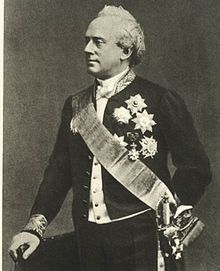Walthère Frère-Orban
Hubert Joseph Walthère Frère-Orban (born April 24, 1812 in Liège , † January 2, 1896 in Brussels ) was a Belgian statesman.
Life
Frère-Orban devoted himself to the study of law in Paris , settled as a lawyer in his hometown in 1832 and married the wealthy Miss Orban, from whom he took the second half of his name. After he had already earned a respected name as a member of the liberal society Union founded against the Catholic ministries, in 1846 as a member of the Liège Association libérale at the Brussels liberal congress and as a co-editor of the Journal de Liège and an influential member of the city administration of Liège He was elected to the Chamber by the Liberal Party in June 1847 and, after the overthrow of the Catholic cabinet de Theux, took over the portfolio of public works in the Rogier Ministry formed on August 12 . From July 18, 1848 to June 1852, he managed the finances and successfully met the financial crisis after 1848 by introducing an inheritance tax and founding the Belgian National Bank.
He devoted several years to the elaboration of his work La main-morte et la charité (Brussels 1854-57, 2 vols.) And, in 1857, when the Ministry de Decker presented this question to the Chamber by submitting a charity law according to the wishes of the clerical party contributed so successfully to the debates that the proposal fell, and with it the ministry, and he was given back the portfolio of finances. With a brief interruption in 1861, Frère remained in the ministry until 1870, and in 1868, after Rogier's resignation, he was given the presidency of the same.
He managed the finances excellently and always knew how to obtain the necessary funds for the constantly growing needs and also for special expenses such as buildings, the replacement of the Scheldt tariff and the abolition of the urban octrois. As head of the government in 1869 he very skillfully broke off France's attempt to get hold of the latter by means of a treaty between the Eastern Railways and part of the Belgian railways, and dealt with France with minor concessions without actually breaking it . But the Frère cabinet was overthrown by the new elections in June 1870 and had to make way for the clerical ministry d'Anethan . When the Liberals finally won the elections in 1878, Frère took over again the formation of a liberal cabinet, which came about on June 21, and immediately tried to break the power of the clergy by a new education law in 1879 . When the Roman Curia , which promised to moderate the stubborn attitude of the Belgian clergy, showed itself ambiguously, in 1880 he did not hesitate to break off diplomatic relations with it. Nevertheless, he was unable to satisfy the radical elements in the liberal party and rejected them by his refusal to introduce universal suffrage in Belgium, so that a conflict arose among the liberals, which led to their defeat in the elections in 1884 and thus also resulted in the overthrow of the Frère ministry.
Frère-Orban was an active Freemason in the Masonic Lodge in Liège.
Individual evidence
- ↑ Eugen Lennhoff, Oskar Posner, Dieter A. Binder: Internationales Freemaurer Lexikon . 5th edition 2006, Herbig Verlag, ISBN 978-3-7766-2478-6 , p. 315
Web links
| personal data | |
|---|---|
| SURNAME | Brother-Orban, Walthère |
| ALTERNATIVE NAMES | Frère-Orban, Hubert Joseph Walthère (full name) |
| BRIEF DESCRIPTION | Belgian statesman |
| DATE OF BIRTH | April 24, 1812 |
| PLACE OF BIRTH | Liege |
| DATE OF DEATH | January 2, 1896 |
| Place of death | Brussels |

